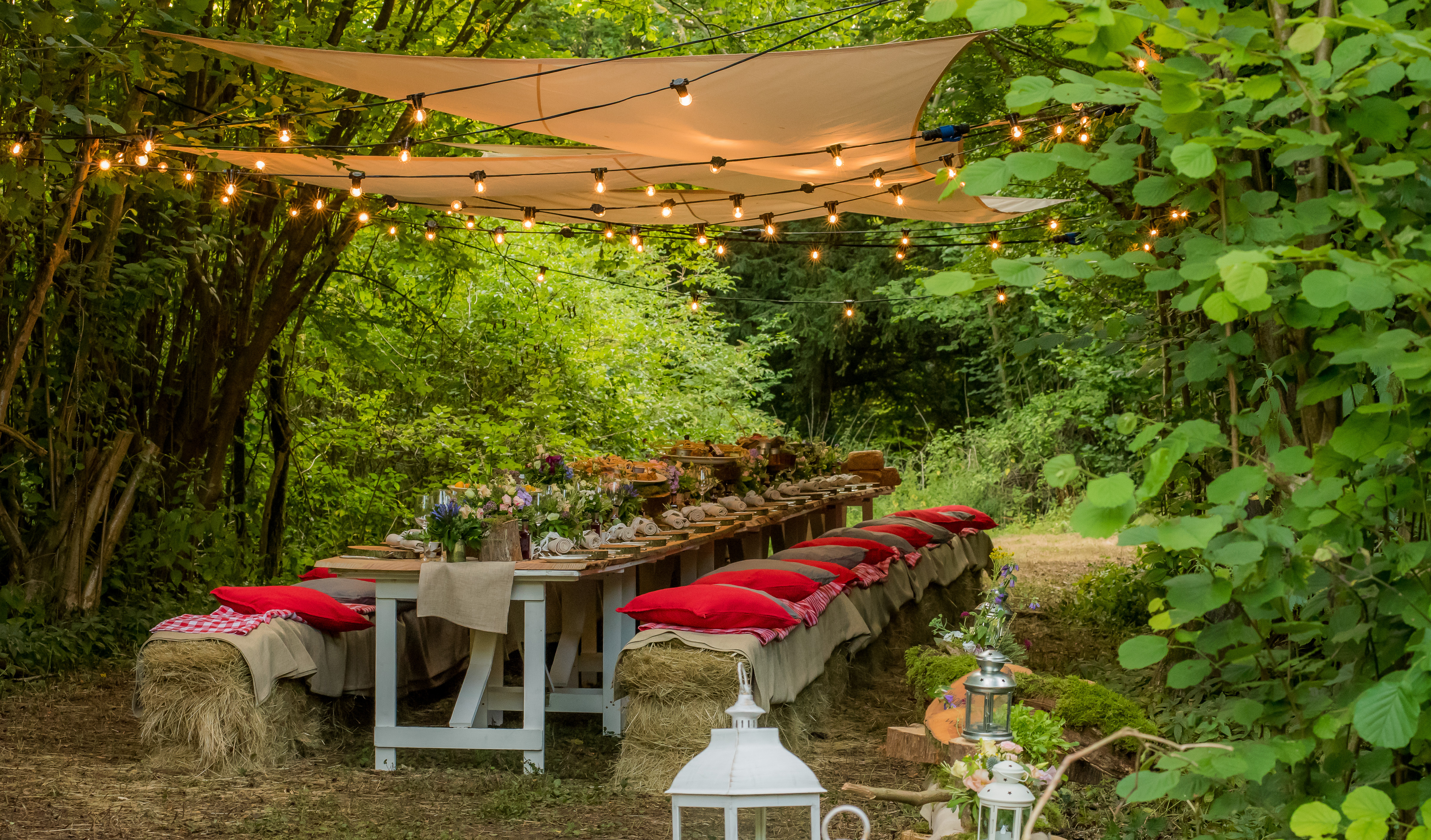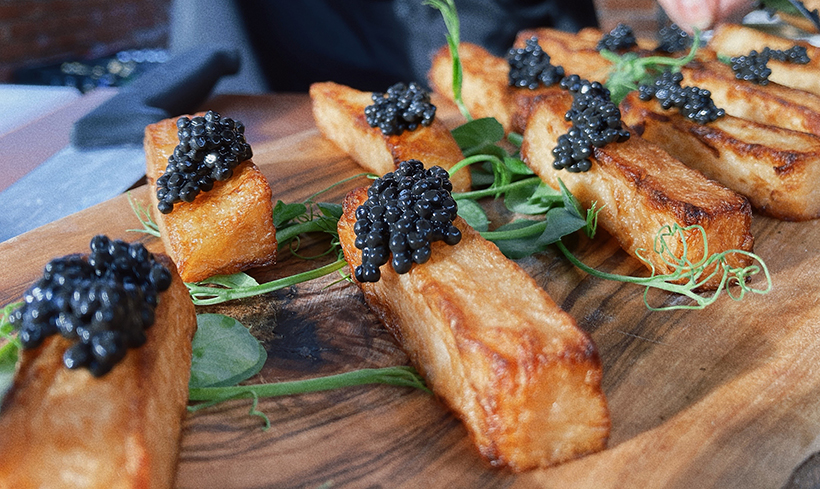Couples are planning on strolling up the aisle in gardens, parks and fields this year as the market for outdoor weddings is blooming. Here's how operators can provide a stylish and high-quality service, even when the inevitable storm hits
This is set to be the year of the outdoor wedding. UK planning resource Rock My Wedding predicts that outdoor receptions and dancefloors will be big, while Hitched.co.uk suggests back garden weddings are on the rise. And it's all thanks to Covid.
Temporary legislation allowing outdoor weddings and civil partnerships to take place in the grounds of licensed venues in England and Wales was put in place last summer, legislation that became permanent on 6 April this year after overwhelming support from the public, every major faith group and the wedding industry. This increased flexibility has already led to a rise in couples exploring and requesting outdoor catering options along with their ceremony.
Midlands-based catering company Caviar & Chips has seen a 10%-20% increase in outdoor wedding catering requests for the next six to nine months, and Asian wedding catering specialist Mazaa in London has also seen a similar 15%-20% increase.
Edinburgh-based event and wedding catering business Hickory manages several venues that have ample outdoor space for weddings – in Scotland couples have already been able to marry outdoors. One of Hickory's venues, the Cairns Farm Estate in West Lothian, is seeing huge demand and is already booked for weddings every single Saturday for the next two years.
Zoë Binning, wedding business consultant and owner of Wild Roots Kitchen & Bar, suggests the trend was already on its way over from America, where backyard weddings are more common, as well as being driven by the changing demographics of weddings.
"Marquee weddings tend to be younger couples on their parents' land or gardens, or ‘older couples' who are looking for something unique and want a relaxed, chilled festival vibe. They're the ones who are usually paying for it themselves and are doing the food the way they want to do it," she says.
Say I do to different food formats
Several operators indicated that outdoor wedding catering lends itself well to the more relaxed, informal style of celebration a lot of couples are after these days, whether that's sharing boards, grazing tables, afternoon teas, barbecues or hog roasts.
"The three-course wedding breakfast is still very popular, but people are having that flexibility to play around a little bit, whether it's with format, food or ideas, and using their background and their narrative and relationship as a couple to create weddings that are a bit different and a bit more of a one-off," agrees Jonathan Carter-Morris, co-founder of Caviar & Chips.
"There is a bit more freedom and flexibility to create something that is a little more different than if you were in a venue or hotel. It's a bit more of a blank canvas."
Nicky Pratt, marketing and sales director at Mazaa, is seeing creative approaches to both cuisine and presentation as couples move away from the traditional Asian wedding celebration. "We're already starting to see people wanting something a bit more interactive, whether that's sharing platters or having a dessert station – more and more people are saying we want to really show the character of the couple," she says.
"For example, you've got couples who have been to a different country and they love that cuisine. We've seen a lot of fusion of different types of cuisine, so not necessarily just Asian cuisines, but perhaps a mixture of some of their favourites from going on holiday to Spain and having paella."
De'Osa Catering & Events in London, for instance, which specialises in Nigerian, Ghanaian, Sierra Leonean, and Jamaican cuisines, catered for a Sierra Leonian-Polish wedding recently. "We had Polish guests eating typical African cuisine such as fufu and okra soup, and the Sierra Leonians eating Polish dumplings," recalls catering manager Rita Madu-West.
DIY stations, such as dessert tables and ‘make your own pizzas' are going down well, and Pratt says Mazaa's investment in its styling and presentation is ongoing to ensure how the food is being served is also attractive and engaging.
Hickory, meanwhile, has a vintage-style ice-cream trike, and food innovation and event designer Katy Tan says the "bougie barbecues" have been particularly popular: "We provide really gorgeous meats, sides, salads, it's all beautifully styled and our chefs will be behind the stalls cooking to order for the guests, so it's really interactive."
Carter-Morris suggests light, refreshing, colourful British seasonal food is the way to go for outdoor summer weddings, such as sharing boards and salad bowls, evoking memories of alfresco dining with friends and family and holidays abroad.
The ins and outs of outdoor weddings
Logistically, outdoor wedding catering can prove trickier, with many variables that operators need to consider: "Outdoor catering for us as a caterer is really hard, because in reality it's a five-day operation to make it happen in terms of getting deliveries, food prepped and everything sorted," says Carter-Morris.
"The day before can in effect mean building a restaurant, a kitchen and a bar from scratch in the middle of a field somewhere – and let's not forget all the clearing up afterwards. Logistically it is a huge operation."
He continues: "It does naturally take a lot longer, there are a lot more people involved to make it happen, and getting all the logistics in place so the day itself can run smoothly is a job in itself. The reality is that then makes a bit of an impact in terms of price."
Another thing to consider is keeping drinks cool, which requires fridges or a fridge trailer if access to a kitchen isn't an option. "It's a real shame if you go to all the effort of having an incredible outdoor wedding and then you don't invest a little bit more in making sure that we've got adequate fridge space and a generator so we can get everything chilled down to the proper temperature," says Carter-Morris.
"Yes, it costs a little bit more, but having a fridge trailer with chilled Champagne is always money well spent in my book."
It's also about ensuring where the food is being prepared is close enough to where it is being served. "Often we find with outdoor venues, for instance if there's a walled garden at a large house, the area we set up and have to prep our food in is quite far away from where we actually end up having to serve it for a drinks reception. We always have to consider those things when we're creating our menus," says Tan.
Caterers must ensure there is running water, that delivery vehicles can get close enough to the venue without getting stuck, and there must be enough power for the kitchen equipment on top of lights, music and the bar. Some things we will make sure are self-contained and don't need power – a paella dish, for example, or a barbecue," says Pratt.
Carter-Morris estimates outdoor wedding catering costs between 10%-20% more than indoors, mainly because the set-up requires potentially another four to five team members. Operators agree the team is crucial.
"Things can easily go wrong if you don't have a strong team behind you," says Madu-West. "It's not just food, it's teamwork, liaising with the co-ordinators and the other vendors to make sure it's executed successfully."
Binning agrees: "It can make or break a day if the team are not on point, or there aren't enough of them, or they're just not experienced enough."
What to do when it rains at a wedding
And of course, this is the UK, and wet and windy weather will happen – so operators must ensure they have a wet weather Plan B that is as strong as Plan A.
"It's making sure that everything we do, we can still do even if we need to move the guests inside," says Pratt. "We can still barbecue outside under a pop-up tent and then serve that inside. With food stations or paella we can largely translate that inside, so they're not going to lose the impact of that casual, interactive experience."
Carter-Morris encourages staff to have a change of socks and shoes with them when there is the potential for wet weather, and the team always does a pre-event venue visit to assess the situation.
Binning, meanwhile, emphasises that operators need to be upfront with their clients about the number of staff or potentially hidden costs outdoor wedding catering may require, should rainy or windy weather hit on the day.
"You might need at the eleventh hour to hire in some extra marquees and there will be an extra cost to that," she says.
She suggests having those conversations with the couple early doors to explain: "You could say there might be additional kit required to undertake the wedding the way you wanted if the weather is going to be bad, and the cost of that will be so much. Do you want to go down that route, and if not, maybe we need to come up with another way of organising and managing your day to ensure that we cover all bases and you know upfront this is your cost."
Some operators may be concerned about having such conversations and risk not appearing competitive on price. But Binning points out that, if you do not prepare yourself and your clients and then unexpected costs come into play at the last minute, who foots that bill?
"You don't want to end up doing a wedding at a loss," she points out.
Where to invest?
Outdoor catering potentially requires investment in different areas, and while De'Osa is investing in new vans and expanding its team, Tan's focus at Hickory is developing its outdoor drinks offering.
"We've got a wedding coming up this summer and we're basically building an outdoor pub for them at one of our venues, so we're having a beautiful, rustic wooden bar with stools, kegs and taps," she says.
The business has also been investing in fire pits to offer guests s'mores or marshmallow desserts, as well as its street food pop-up offering. The company has several portable food stands with their own signage and styling, ranging from crêpes and mac 'n' cheese, to tacos and Margaritas.
Mazaa has invested in more gazebos for both guests and for staff to cook under outside should the weather turn bad.
Ultimately, Binning stresses that operators need to be able to stake their reputation on their ability to deliver a quality outdoor wedding catering option if it's something they're going to offer: "Is it more important to make a quick buck or to be confident that your reputation will be intact because you've produced the best event you possibly can at a realistic price, and with the level of service that is required? Ultimately the companies that do that are the ones that, in my experience, will stick around."
Continue reading
You need to be a premium member to view this. Subscribe from just 99p per week.
Already subscribed? Log In






